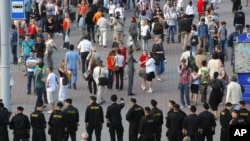Under the rule of its long-time President, Alyaksandr Lukashenka, who came to power in 1994, Belarus has consistently been out of step with its European neighbors with respect to democratic and free-market reforms; out of line with its international commitments due to persistent human rights violations; and it has never held an election seen as fair by international monitors.
The elections of March 2006 were deemed by international observers to be blatantly fraudulent. Opposition protests were brutally suppressed and numerous government critics simply disappeared.
Corruption in Belarus had reached such levels, said then-President George W. Bush, that it threatened "important United States interests globally, including ensuring security and stability, the rule of law, and core democratic values, advancing prosperity and creating a level playing field for lawful business activity."
For these reasons, in 2006, the U.S. government imposed financial sanctions on President Lukashenka and a number of top officials in his government.
On December 19, 2010, Belarus held yet another flawed Presidential election which also reelected Lukashenka. This led President Barack Obama to extend the mandate for those sanctions for yet another year. In a written statement released by the White House on June 14, President Obama stated: "The flawed December 2010 Presidential election in Belarus and its aftermath — the harsh violence against peaceful demonstrators; the continuing detention, prosecution, and imprisonment of opposition Presidential candidates and others; and the continuing repression of independent media and civil society activists — all show that the Government of Belarus has taken steps backward in the development of democratic governance and respect for human rights." In a prior statement, the President also said that sanctions on Belarus would be expanded in light of the convictions of opposition Presidential candidates and other political prisoners.
These actions are not aimed at the Belarusian people. U.S. government sanctions target those responsible for the repression, particularly President Lukashenka and his close political circle. At the same time, the United States is planning to expand its assistance to the people of Belarus in support of democratic reform.
Backsliding in Belarus

Under the rule of its long-time President, Alyaksandr Lukashenka, who came to power in 1994, Belarus has consistently been out of step with its European neighbors with respect to democratic and free-market reforms.


















